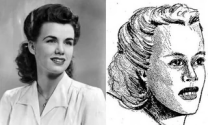I can understand that 'Larry' would have warned Douglas off Jean, but the obvious reason for this would be her association with Dave Ogul, which seems solid. It would be madness for an up and coming star to cross a leading Hollywood mobster, especially at a time of high tension caused by a struggle for control of rackets in Hollywood. So, to my mind, a warning is entirely consistent with the theories involving either the targeting of Ogul for his activities or the theory put forward by Lee Server (see #176 above) that both Ogul and Spangler were collateral damage to undermine Mickey Cohen. An experienced studio hand would certainly be aware of the issues and may even have known Roselli (given his long presence as the mob representative in Hollywood) and been set up to give a warning.I think the guy you are referring to was his stand-in (Larry, no last name) who "warned" KD about Jean. Good ol' Kirk was known for coming onto females left and right (I say "females" because young girls were on his radar too, by his own admission), but he stops any pursuit because his stand-in tells him that she would use him to advance her career, and that is something KD draws the line at? He had no trouble luring 16-year-old Natalie Wood to a hotel room promising her an audition in a film he waa producing, but an extra that he showed interest in wanting to get more opportunities in the industry by dating him was somehow deeply offensive? Ugh.
Install the app
How to install the app on iOS
Follow along with the video below to see how to install our site as a web app on your home screen.
Note: This feature may not be available in some browsers.
You are using an out of date browser. It may not display this or other websites correctly.
You should upgrade or use an alternative browser.
You should upgrade or use an alternative browser.
CA CA - Jean Spangler, 27, Los Angeles, Oct 1949
- Thread starter Richard
- Start date

Jean Spangler, age 27 Missing since October 1949
LINK:

70 Years Ago, Actress Jean Spangler Disappeared Leaving Only a Cryptic Note Behind
To this day, no one really knows what became of Jean Spangler, who disappeared over 70 years ago. Check out all the details!
Noirdame79
Amateur Sleuth
- Joined
- Dec 14, 2013
- Messages
- 571
- Reaction score
- 786
Douglas didn't mention Jean's alleged mob ties. I think he would have if it was ever a real concern for him (in fact, I think he would have used it to "corroborate" his version of events, that he was the victim in this situation). He said that Larry told him that Jean was a "star-*advertiser censored***r and bad news" but didn't elaborate. This was so many years later in writing his autobiography, I don't think he would have been worried about any of these 1940s gangsters coming after him (if he did indeed have a fear of that).I can understand that 'Larry' would have warned Douglas off Jean, but the obvious reason for this would be her association with Dave Ogul, which seems solid. It would be madness for an up and coming star to cross a leading Hollywood mobster, especially at a time of high tension caused by a struggle for control of rackets in Hollywood. So, to my mind, a warning is entirely consistent with the theories involving either the targeting of Ogul for his activities or the theory put forward by Lee Server (see #176 above) that both Ogul and Spangler were collateral damage to undermine Mickey Cohen. An experienced studio hand would certainly be aware of the issues and may even have known Roselli (given his long presence as the mob representative in Hollywood) and been set up to give a warning.
So much of what Douglas was trying to allege was like a "gone girl" conspiracy - that Jean wrote the note implicating him as if she planned to disappear or knew that she would and was trying to frame him and that her family and friends were conspiring against him to make him out to be responsible for her going missing (and that he had impregnated her). His claim to have heard via a TV news report that Jean was murdered and her body was found near the Mexican border (and that was when he began to panic, after joking about the note that was found in her purse) is the other thing that I find very concerning because that was what he claimed led him to be "interviewed" by the police, even though once again, his re-telling of this and what Jean's family and friends supposedly said about him directly contradicts what actually happened. The misogynistic language is another concern, as this seems common in cases where a female victim is smeared to make it seem like she somehow deserved what happened to her (and it's strange that Douglas would, even supposedly via other people's comments to him, would make such an effort to portray Jean in a bad light, when he claimed to have barely known her). The fact that he twice referred to what happened to Jean Spangler as a "murder" and even claimed that her body had been found - I'm surprised that people who professionally researched this case either didn't read The Ragman's Son or didn't think to mention what Douglas wrote. Did Kirk Douglas make a slip or a mistake? As I said, you can argue that because he was writing about this nearly 40 years later, he could have just made an error, but it's a strange error to make, and given that he doesn't seem to be truthful in his re-telling of these events anyway, it does make you wonder. Even if he had no direct involvement, did he know more than he let on or did he know Jean more intimately than he claimed? The latter would not be a stretch, since we know he got around and he was, in my opinion, a sexual predator.
At the time his first autobio was published in the late 1980s, there was no internet, and I doubt the general public, at least, had ever heard of Jean or her disappearance. It wasn't until the 2000s with the Mysteries And Scandals episode covered this case that it started to gain traction, with two historical fiction books taking inspiration from it, and of course, the internet has kept this case alive, in part because it is still unsolved, there are so many theories and possibilities as to what might have happened to her and who was responsible, and of course, the Hollywood connection. Was Douglas so brazen that he felt he could claim that she was murdered and state it as fact and think that no one would realize that what he wrote was false, or think that he did have some knowledge or possible involvement in her going missing? If it had been him just believing that she was murdered (and I think that is likely as well), that would be one thing, but he claimed to have heard about her body being found on television a few days after reading about her disappearance (oddly, during this police interview that he claimed to have had, there's no mention of Chief Thad Brown referring to what happened to Spangler as murder either, she had only been missing for a few weeks if that). Things that make you go hmm.
Last edited:
I recommend a look at Lee Server's biography of Johnny Roselli. Roselli was the Chicago mobs man in Hollywood and, to all intents and purposes, the LA boss for all things entertainment. He knew all the stars and had most of the studio bosses in his pocket. He was also the enemy of Mickey Cohen and so his men, and David Ogul was one of Cohen's closest allies. He would certainly have put the word out to warn off his contacts from anyone associated with Cohen or his men and doing that through a third party would be his style. Douglas may have fancied himself as a hard man but, with his background, he would have known not to cross organised crime or bring their name into the open, even many years later. The really key issue here is the person of Jimmy Fratianno. He was a senior (at one time acting boss) mobster who turned informer and government witness, and a friend of Roselli. Server's information on the possible story around Ogul and Spangler came from Fratianno originally who was convicted (he admitted it) of the murder of Ogul colleague Frank Niccoli at the same time as Ogul and Spangler disappeared.Douglas didn't mention Jean's alleged mob ties. I think he would have if it was ever a real concern for him (in fact, I think he would have used it to "corroborate" his version of events, that he was the victim in this situation). He said that Larry told him that Jean was a "star-*advertiser censored***r and bad news" but didn't elaborate. This was so many years later in writing his autobiography, I don't think he would have been worried about any of these 1940s gangsters coming after him (if he did indeed have a fear of that).
So much of what Douglas was trying to allege was like a "gone girl" conspiracy - that Jean wrote the note implicating him as if she planned to disappear or knew that she would and was trying to frame him and that her family and friends were conspiring against him to make him out to be responsible for her going missing (and that he had impregnated her). His claim to have heard via a TV news report that Jean was murdered and her body was found near the Mexican border (and that was when he began to panic, after joking about the note that was found in her purse) is the other thing that I find very concerning because that was what he claimed led him to be "interviewed" by the police, even though once again, his re-telling of this and what Jean's family and friends supposedly said about him directly contradicts what actually happened. The misogynistic language is another concern, as this seems common in cases where a female victim is smeared to make it seem like she somehow deserved what happened to her (and it's strange that Douglas would, even supposedly via other people's comments to him, would make such an effort to portray Jean in a bad light, when he claimed to have barely known her). The fact that he twice referred to what happened to Jean Spangler as a "murder" and even claimed that her body had been found - I'm surprised that people who professionally researched this case either didn't read The Ragman's Son or didn't think to mention what Douglas wrote. Did Kirk Douglas make a slip or a mistake? As I said, you can argue that because he was writing about this nearly 40 years later, he could have just made an error, but it's a strange error to make, and given that he doesn't seem to be truthful in his re-telling of these events anyway, it does make you wonder. Even if he had no direct involvement, did he know more than he let on or did he know Jean more intimately than he claimed? The latter would not be a stretch, since we know he got around and he was, in my opinion, a sexual predator.
At the time his first autobio was published in the late 1980s, there was no internet, and I doubt the general public, at least, had ever heard of Jean or her disappearance. It wasn't until the 2000s with the Mysteries And Scandals episode covered this case that it started to gain traction, with two historical fiction books taking inspiration from it, and of course, the internet has kept this case alive, in part because it is still unsolved, there are so many theories and possibilities as to what might have happened to her and who was responsible, and of course, the Hollywood connection. Was Douglas so brazen that he felt he could claim that she was murdered and state it as fact and think that no one would realize that what he wrote was false, or think that he did have some knowledge or possible involvement in her going missing? If it had been him just believing that she was murdered (and I think that is likely as well), that would be one thing, but he claimed to have heard about her body being found on television a few days after reading about her disappearance (oddly, during this police interview that he claimed to have had, there's no mention of Chief Thad Brown referring to what happened to Spangler as murder either, she had only been missing for a few weeks if that). Things that make you go hmm.
I can see no reason to doubt such sources about Spangler's fate given how much else of Fratianno's information has been proven correct. The only real questions seem to me to be the motive for the murders (Ogul as a direct target or a proxy to get at Cohen) and whether Roselli did warn off KD and possibly others through third parties. Given the parties are now all dead I doubt those questions will ever be answered.
Noirdame79
Amateur Sleuth
- Joined
- Dec 14, 2013
- Messages
- 571
- Reaction score
- 786
When re-looking up the obituary of Jean's ex-husband Dexter Benner, it is stated in the comments that he died of cancer. The comments about him are positive, but I think it's important to stress that these people knew him in his later years, and probably know nothing (or very little) about his past.
Noirdame79
Amateur Sleuth
- Joined
- Dec 14, 2013
- Messages
- 571
- Reaction score
- 786
Obituary  Interestingly, in one of the comments, one of her children from her marriage to Ely Lasky (she had a son and a daughter with him), mentioned that after the divorce and her marriage to Dexter Benner, her children lost touch with her for 44 years. They did re-establish contact with her before she died. They were 7 and 6 years old when they saw her last before reuniting with her years later (her daughter is the same age as Christine) and didn't see her again until the 1990s. Was that Dexter's doing, Ely's doing, or was it her own choice? She married Dexter Benner in 1949, but he fled the state with her and Christine in 1953. The message from her son is a loving one, but it does raise questions. There were a few years where she could have kept in contact with her children before leaving California but it appears that she did not. You can argue that she and Dexter were technically on the run from the LAPD from 1953 on, but as another poster pointed out, they seemed to have lived a normal life in Florida. They didn't change their names, Christine and her younger half-sisters attended school, Dexter operated a business, Lynn worked as an artist and her work was displayed in galleries, etc. They weren't in hiding, except perhaps in the early years. Even if she didn't contact her children when they were young for fear of them disclosing her and Dexter's whereabouts, she could have gotten into contact with them much sooner, perhaps when they were young adults, 44 years is a long time. Jean's mother Florence died in 1993, so that might explain why she waited to re-establish a relationship with them, because not only was Florence convinced that Dexter was responsible for Jean's disappearance, but she searched for Christine for the rest of her life (RIP Florence, you were a fighter).
Interestingly, in one of the comments, one of her children from her marriage to Ely Lasky (she had a son and a daughter with him), mentioned that after the divorce and her marriage to Dexter Benner, her children lost touch with her for 44 years. They did re-establish contact with her before she died. They were 7 and 6 years old when they saw her last before reuniting with her years later (her daughter is the same age as Christine) and didn't see her again until the 1990s. Was that Dexter's doing, Ely's doing, or was it her own choice? She married Dexter Benner in 1949, but he fled the state with her and Christine in 1953. The message from her son is a loving one, but it does raise questions. There were a few years where she could have kept in contact with her children before leaving California but it appears that she did not. You can argue that she and Dexter were technically on the run from the LAPD from 1953 on, but as another poster pointed out, they seemed to have lived a normal life in Florida. They didn't change their names, Christine and her younger half-sisters attended school, Dexter operated a business, Lynn worked as an artist and her work was displayed in galleries, etc. They weren't in hiding, except perhaps in the early years. Even if she didn't contact her children when they were young for fear of them disclosing her and Dexter's whereabouts, she could have gotten into contact with them much sooner, perhaps when they were young adults, 44 years is a long time. Jean's mother Florence died in 1993, so that might explain why she waited to re-establish a relationship with them, because not only was Florence convinced that Dexter was responsible for Jean's disappearance, but she searched for Christine for the rest of her life (RIP Florence, you were a fighter).
Dexter Benner, at least when it came to Jean and her family, does come off as abusive, controlling, and misogynistic. Did he mistreat Lynn as well? As I've said before, it sounds like Christine was manipulated and brainwashed into either forgetting her mother and her family or turning against them. I can't imagine the confusion and trauma she went through. That's another tragic aspect of this case. Jean was never found, so no answers there, and her family never saw Christine again, the child was taken away from her grandmother not long after her mother disappeared.
 Interestingly, in one of the comments, one of her children from her marriage to Ely Lasky (she had a son and a daughter with him), mentioned that after the divorce and her marriage to Dexter Benner, her children lost touch with her for 44 years. They did re-establish contact with her before she died. They were 7 and 6 years old when they saw her last before reuniting with her years later (her daughter is the same age as Christine) and didn't see her again until the 1990s. Was that Dexter's doing, Ely's doing, or was it her own choice? She married Dexter Benner in 1949, but he fled the state with her and Christine in 1953. The message from her son is a loving one, but it does raise questions. There were a few years where she could have kept in contact with her children before leaving California but it appears that she did not. You can argue that she and Dexter were technically on the run from the LAPD from 1953 on, but as another poster pointed out, they seemed to have lived a normal life in Florida. They didn't change their names, Christine and her younger half-sisters attended school, Dexter operated a business, Lynn worked as an artist and her work was displayed in galleries, etc. They weren't in hiding, except perhaps in the early years. Even if she didn't contact her children when they were young for fear of them disclosing her and Dexter's whereabouts, she could have gotten into contact with them much sooner, perhaps when they were young adults, 44 years is a long time. Jean's mother Florence died in 1993, so that might explain why she waited to re-establish a relationship with them, because not only was Florence convinced that Dexter was responsible for Jean's disappearance, but she searched for Christine for the rest of her life (RIP Florence, you were a fighter).
Interestingly, in one of the comments, one of her children from her marriage to Ely Lasky (she had a son and a daughter with him), mentioned that after the divorce and her marriage to Dexter Benner, her children lost touch with her for 44 years. They did re-establish contact with her before she died. They were 7 and 6 years old when they saw her last before reuniting with her years later (her daughter is the same age as Christine) and didn't see her again until the 1990s. Was that Dexter's doing, Ely's doing, or was it her own choice? She married Dexter Benner in 1949, but he fled the state with her and Christine in 1953. The message from her son is a loving one, but it does raise questions. There were a few years where she could have kept in contact with her children before leaving California but it appears that she did not. You can argue that she and Dexter were technically on the run from the LAPD from 1953 on, but as another poster pointed out, they seemed to have lived a normal life in Florida. They didn't change their names, Christine and her younger half-sisters attended school, Dexter operated a business, Lynn worked as an artist and her work was displayed in galleries, etc. They weren't in hiding, except perhaps in the early years. Even if she didn't contact her children when they were young for fear of them disclosing her and Dexter's whereabouts, she could have gotten into contact with them much sooner, perhaps when they were young adults, 44 years is a long time. Jean's mother Florence died in 1993, so that might explain why she waited to re-establish a relationship with them, because not only was Florence convinced that Dexter was responsible for Jean's disappearance, but she searched for Christine for the rest of her life (RIP Florence, you were a fighter).Dexter Benner, at least when it came to Jean and her family, does come off as abusive, controlling, and misogynistic. Did he mistreat Lynn as well? As I've said before, it sounds like Christine was manipulated and brainwashed into either forgetting her mother and her family or turning against them. I can't imagine the confusion and trauma she went through. That's another tragic aspect of this case. Jean was never found, so no answers there, and her family never saw Christine again, the child was taken away from her grandmother not long after her mother disappeared.
Last edited:
Noirdame79
Amateur Sleuth
- Joined
- Dec 14, 2013
- Messages
- 571
- Reaction score
- 786
I've been trying to collect the films that Jean Spangler appeared in. As she was an extra and uncredited, it is hard to spot her in many of them. She was either in crowd scenes (audience member, dancer/chorus girl) and/or in scenes shot from a considerable distance. However, it is my understanding that in The Miracle Of The Bells (1948), she had her biggest role; not only is there a moment where she appears onscreen and you can instantly recognize her, but she had a line of dialogue - "They're turning".
This screen capture is from a blog, and it's small. When I get the film on DVD I'll try to make a bigger and better quality image.
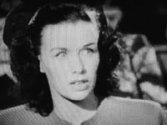
There are two other films she appeared in I haven't seen yet - Chicken Every Sunday (1948) which is available on DVD but it's a bit pricey (at least on the Canadian Amazon site); the movie also features a young Natalie Wood during her child acting days, which is another reason why I want to see it. The other is one of the last films she made before her disappearance, The Petty Girl (1950), which has not had an official DVD release but DVD-R copies can be ordered from sites that specialize in rare films. This lobby card (the stars, Robert Cummings and Joan Caulfield, are prominently featured), shows a scene that takes place in a nightclub, and people are dancing to the right of them. The woman on the far right looks like Jean, and on her IMDB page, she is listed as "Nightclub Patron (uncredited)" for this movie.
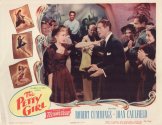
A colorized version of Champagne For Caesar (1950) is available on YouTube, and she is listed on IMDB as being a TV audience member, but again, it's hard to spot her. The same can be said of her appearances in When My Baby Smiles At Me (1948) and Wabash Avenue (1950) - both of which, along with Chicken Every Sunday was made at 20th Century-Fox -where she is listed as "chorus girl" and "show girl". Young Man With Horn (1950), made at Warner Brothers, and the movie that she is the most often associated with - she is listed as a "hula dancer" - but again, I've had a hard time seeing her. (Incidentally, Kirk Douglas, according to official police reports, referred to her as "the girl in the green dress" on the set of that film).
A better quality version of Jean Spangler with her siblings, Richard, Eddie (killed in action in 1945), and Betsy.
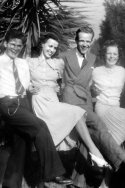
This screen capture is from a blog, and it's small. When I get the film on DVD I'll try to make a bigger and better quality image.

There are two other films she appeared in I haven't seen yet - Chicken Every Sunday (1948) which is available on DVD but it's a bit pricey (at least on the Canadian Amazon site); the movie also features a young Natalie Wood during her child acting days, which is another reason why I want to see it. The other is one of the last films she made before her disappearance, The Petty Girl (1950), which has not had an official DVD release but DVD-R copies can be ordered from sites that specialize in rare films. This lobby card (the stars, Robert Cummings and Joan Caulfield, are prominently featured), shows a scene that takes place in a nightclub, and people are dancing to the right of them. The woman on the far right looks like Jean, and on her IMDB page, she is listed as "Nightclub Patron (uncredited)" for this movie.

A colorized version of Champagne For Caesar (1950) is available on YouTube, and she is listed on IMDB as being a TV audience member, but again, it's hard to spot her. The same can be said of her appearances in When My Baby Smiles At Me (1948) and Wabash Avenue (1950) - both of which, along with Chicken Every Sunday was made at 20th Century-Fox -where she is listed as "chorus girl" and "show girl". Young Man With Horn (1950), made at Warner Brothers, and the movie that she is the most often associated with - she is listed as a "hula dancer" - but again, I've had a hard time seeing her. (Incidentally, Kirk Douglas, according to official police reports, referred to her as "the girl in the green dress" on the set of that film).
A better quality version of Jean Spangler with her siblings, Richard, Eddie (killed in action in 1945), and Betsy.

Last edited:
Noirdame79
Amateur Sleuth
- Joined
- Dec 14, 2013
- Messages
- 571
- Reaction score
- 786
Jean's father, Cecil Spangler (1895 - 1962)
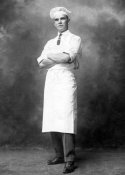
Jean's brother, Richard Spangler (1918 -2003)
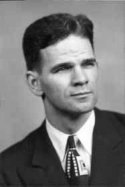
Jean's mother Florence Spangler (1894 - 1991) and Jean's sister Betsy (1920 - 1996) at a 1949 custody hearing for Jean's daughter Christine
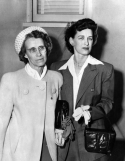
A family photo of the Spanglers which appears to have been taken in the late 1930s or early 1940s. The man named Douglas is the first husband of Jean's sister Betsy
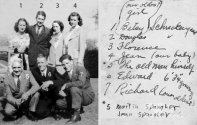
Florence Spangler in 1949, after Jean's disappearance
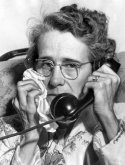

Jean's brother, Richard Spangler (1918 -2003)

Jean's mother Florence Spangler (1894 - 1991) and Jean's sister Betsy (1920 - 1996) at a 1949 custody hearing for Jean's daughter Christine

A family photo of the Spanglers which appears to have been taken in the late 1930s or early 1940s. The man named Douglas is the first husband of Jean's sister Betsy

Florence Spangler in 1949, after Jean's disappearance

Noirdame79
Amateur Sleuth
- Joined
- Dec 14, 2013
- Messages
- 571
- Reaction score
- 786
When My Baby Smiles At Me (1948) is a 20th Century-Fox musical starring Betty Grable and Dan Dailey. It's one of a handful of Fox musicals that has not been released on DVD. It has been uploaded to YouTube, but it's not the best quality (it was taken off of a videocassette), but the first musical number is on that site in better quality. I was able to spot Jean Spangler in the first musical number of the film and the last one.
Photographs from the first musical number:
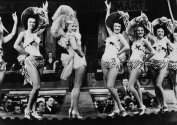
Color version used for a lobby card/poster:
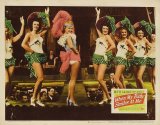
Screen captures:
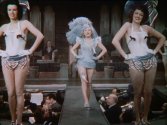
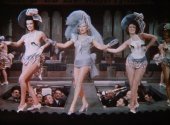
Screen captures from the film's last musical number:
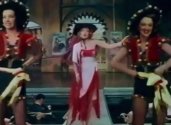
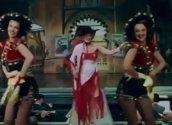
While the last two captures are not as good quality as the ones from the first musical number, in both instances Jean is standing next to Betty Grable, on the left.
Another photo from the first musical number; Jean Spangler is on the far left.
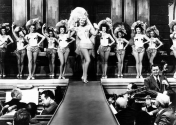
Wabash Avenue (1950) is a 20th-Century-Fox musical starring Betty Grable and Victor Mature. Although it's possible that Jean Spangler was in the background of the movie's musical numbers, I was only able to spot her in the final musical sequence.

This photo of Jean Spangler was taken during the filming of When My Baby Smiles At Me (1948)
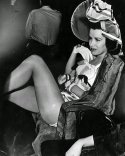
Photographs from the first musical number:

Color version used for a lobby card/poster:

Screen captures:


Screen captures from the film's last musical number:


While the last two captures are not as good quality as the ones from the first musical number, in both instances Jean is standing next to Betty Grable, on the left.
Another photo from the first musical number; Jean Spangler is on the far left.

Wabash Avenue (1950) is a 20th-Century-Fox musical starring Betty Grable and Victor Mature. Although it's possible that Jean Spangler was in the background of the movie's musical numbers, I was only able to spot her in the final musical sequence.

This photo of Jean Spangler was taken during the filming of When My Baby Smiles At Me (1948)

Brightchaser47
Well-Known Member
- Joined
- Dec 2, 2022
- Messages
- 1,462
- Reaction score
- 6,530
Poor Mama. I think Jean's lifestyle and disappearance took a toll...jmoJean's father, Cecil Spangler (1895 - 1962)
View attachment 468457
Jean's brother, Richard Spangler (1918 -2003)
View attachment 468458
Jean's mother Florence Spangler (1894 - 1991) and Jean's sister Betsy (1920 - 1996) at a 1949 custody hearing for Jean's daughter Christine
View attachment 468460
A family photo of the Spanglers which appears to have been taken in the late 1930s or early 1940s. The man named Douglas is the first husband of Jean's sister Betsy
View attachment 468461
Florence Spangler in 1949, after Jean's disappearance
View attachment 468462
rosesfromangels
Amateur opinion and speculation only
- Joined
- Feb 24, 2010
- Messages
- 12,364
- Reaction score
- 63,389
I’ve never forgotten this case. Given the alleged note that was found, I think the most likely scenario is that Jean died as a result of a botched back alley abortion. Her remains were likely secreted away, and hastily buried. It would be interesting to review local funeral homes for any irregularities in their burial records at that time. I’m guessing she was buried as a Jane Doe. You never know….
Amateur opinion and speculation
Amateur opinion and speculation
Noirdame79
Amateur Sleuth
- Joined
- Dec 14, 2013
- Messages
- 571
- Reaction score
- 786
Jean Spangler at a custody hearing in 1948, supported by her friend Betty Wilson
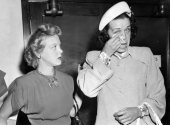
Jean Spangler and her daughter Christine
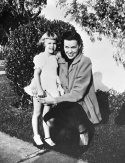
Jean Spangler in costume for the film Wabash Avenue (1950)
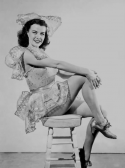
Kirk Douglas, Doris Day, and Lauren Bacall in a publicity portrait for the Warner Brothers film, Young Man With A Horn (1950). Spangler was an extra in this fim, although I haven't been able to spot her. Her mother Florence told police, "I heard her talk about a Kirk she knew around the sets . . . . . but she was at one studio, and then another." Her family and friends confirmed that she had briefly dated a man named Kirk, but they couldn't identify him because he declined to get out of the car both times that he came to pick Spangler up for a date.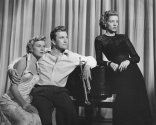
Florence Spangler and her daughter Betsy at a custody hearing after Jean's disappearance. Dexter Benner's attorney claimed that Florence was a "virtual stranger" to Christine, even though Florence had an active role in her granddaughter's life.
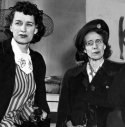

Jean Spangler and her daughter Christine

Jean Spangler in costume for the film Wabash Avenue (1950)

Kirk Douglas, Doris Day, and Lauren Bacall in a publicity portrait for the Warner Brothers film, Young Man With A Horn (1950). Spangler was an extra in this fim, although I haven't been able to spot her. Her mother Florence told police, "I heard her talk about a Kirk she knew around the sets . . . . . but she was at one studio, and then another." Her family and friends confirmed that she had briefly dated a man named Kirk, but they couldn't identify him because he declined to get out of the car both times that he came to pick Spangler up for a date.

Florence Spangler and her daughter Betsy at a custody hearing after Jean's disappearance. Dexter Benner's attorney claimed that Florence was a "virtual stranger" to Christine, even though Florence had an active role in her granddaughter's life.

Noirdame79
Amateur Sleuth
- Joined
- Dec 14, 2013
- Messages
- 571
- Reaction score
- 786
The Miracle Of The Bells (1948) is a drama film made at RKO studios, starring Fred MacMurray, Alida Valli, Frank Sinatra, and Lee J. Cobb. The story is told partly in flashback, about an aspiring actress who dies shortly after completing her first film. The man who was in love with her wants to honor her last wish to have the church bells in her hometown ring for three days after her passing, but it is expensive and he isn't able to raise the money for it. He prays for a miracle that it will somehow happen, hence the film's title. This is where the brief church scene featuring Jean Spangler comes in.
Screen capture:
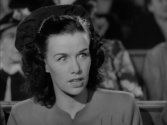
She's onscreen for a few seconds and says "They're turning!" referring to the statues inside the church.
Screen capture:

She's onscreen for a few seconds and says "They're turning!" referring to the statues inside the church.
Noirdame79
Amateur Sleuth
- Joined
- Dec 14, 2013
- Messages
- 571
- Reaction score
- 786
The Petty Girl (1950) is a musical romantic comedy made at Columbia Studios. This is considered to be the last film that Jean Spangler worked on before her disappearance. She appears in a nightclub sequence. The film has never been officially released on DVD, but it has aired on TCM, which is the source of this print. In these screen captures Jean Spangler can be seen on the right of the film's star, Robert Cummings, wearing a burgundy dress.
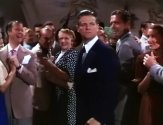
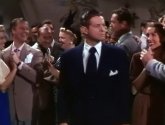
Robert Cummings would later report to police that he had spoken to Spangler on the Columbia back lot, remarking that she looked happy, and she replied that she was and that she had a new romance. She said it wasn't serious, but she was having the time of her life (who was she having the time of her life with, and was this man the father of the child she was supposedly carrying at the time of her disappearance?)
Publicity portrait of Robert Cummings in The Petty Girl (1950)
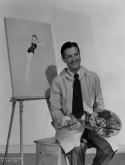


Robert Cummings would later report to police that he had spoken to Spangler on the Columbia back lot, remarking that she looked happy, and she replied that she was and that she had a new romance. She said it wasn't serious, but she was having the time of her life (who was she having the time of her life with, and was this man the father of the child she was supposedly carrying at the time of her disappearance?)
Publicity portrait of Robert Cummings in The Petty Girl (1950)

spartanx
Well-Known Member
- Joined
- Apr 20, 2021
- Messages
- 930
- Reaction score
- 781
I think it was an illegal abortion that went wrong... I think she bled and the doctor hid it because he didn't want to lose his license for doing this illegally... although there is always the possibility that he escaped to some foreign country because it would be recognized in the United States if she stayed... plus I don't think she would want to leave her little girl without a mother...
either way
rest in peace
either way
rest in peace
John/Jane Doe
Well-Known Member
- Joined
- Feb 14, 2021
- Messages
- 4,328
- Reaction score
- 7,848
John/Jane Doe
Well-Known Member
- Joined
- Feb 14, 2021
- Messages
- 4,328
- Reaction score
- 7,848
Noirdame79
Amateur Sleuth
- Joined
- Dec 14, 2013
- Messages
- 571
- Reaction score
- 786
The apartment complex Jean Spangler lived in with her mother and daughter, 6216 Park La Brea, Colgate Avenue, in the Wilshire district of Los Angeles


Another interesting connection to this case is that of Robert Stack. Although he is best remembered for his starring role in the television series The Untouchables, and to those of my generation, as the host of the original Unsolved Mysteries, Stack was a Hollywood veteran whose film career began in the 1930s. Although he was never a star in films, he had a moderately successful career before transitioning to television, playing both romantic leads and supporting parts. Shortly after Spangler's disappearance, Stack contacted the police and spoke to the police chief, Thad Brown. Stack stated that he passed by Jean's apartment on the evening of October 7 and saw what he later realized was a shadowy figure lurking near one of the windows and he later surmised that the person (he couldn't tell if it was a male or a female) was trying to gain access to the apartment. The actor would later tell Hollywood historian Kyle J. Wood that he had put the incident out of his mind until he heard of Jean Spangler's disappearance, as he was tired from his day's work and wanted to get home.



Another interesting connection to this case is that of Robert Stack. Although he is best remembered for his starring role in the television series The Untouchables, and to those of my generation, as the host of the original Unsolved Mysteries, Stack was a Hollywood veteran whose film career began in the 1930s. Although he was never a star in films, he had a moderately successful career before transitioning to television, playing both romantic leads and supporting parts. Shortly after Spangler's disappearance, Stack contacted the police and spoke to the police chief, Thad Brown. Stack stated that he passed by Jean's apartment on the evening of October 7 and saw what he later realized was a shadowy figure lurking near one of the windows and he later surmised that the person (he couldn't tell if it was a male or a female) was trying to gain access to the apartment. The actor would later tell Hollywood historian Kyle J. Wood that he had put the incident out of his mind until he heard of Jean Spangler's disappearance, as he was tired from his day's work and wanted to get home.

Brogan_Ninefingers
New Member
- Joined
- Mar 25, 2024
- Messages
- 1
- Reaction score
- 2
DNASolves
Online statistics
- Members online
- 125
- Guests online
- 2,956
- Total visitors
- 3,081
Totals may include hidden visitors.

